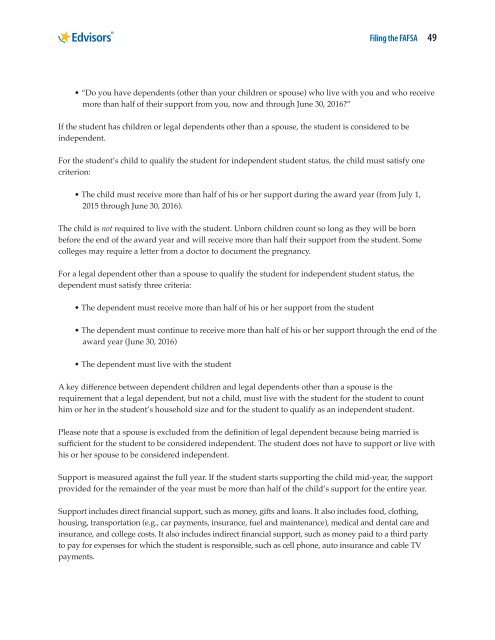filing-the-fafsa-2015-2016-edition
filing-the-fafsa-2015-2016-edition
filing-the-fafsa-2015-2016-edition
Create successful ePaper yourself
Turn your PDF publications into a flip-book with our unique Google optimized e-Paper software.
Filing <strong>the</strong> FAFSA 49<br />
• “Do you have dependents (o<strong>the</strong>r than your children or spouse) who live with you and who receive<br />
more than half of <strong>the</strong>ir support from you, now and through June 30, <strong>2016</strong>”<br />
If <strong>the</strong> student has children or legal dependents o<strong>the</strong>r than a spouse, <strong>the</strong> student is considered to be<br />
independent.<br />
For <strong>the</strong> student’s child to qualify <strong>the</strong> student for independent student status, <strong>the</strong> child must satisfy one<br />
criterion:<br />
• The child must receive more than half of his or her support during <strong>the</strong> award year (from July 1,<br />
<strong>2015</strong> through June 30, <strong>2016</strong>).<br />
The child is not required to live with <strong>the</strong> student. Unborn children count so long as <strong>the</strong>y will be born<br />
before <strong>the</strong> end of <strong>the</strong> award year and will receive more than half <strong>the</strong>ir support from <strong>the</strong> student. Some<br />
colleges may require a letter from a doctor to document <strong>the</strong> pregnancy.<br />
For a legal dependent o<strong>the</strong>r than a spouse to qualify <strong>the</strong> student for independent student status, <strong>the</strong><br />
dependent must satisfy three criteria:<br />
• The dependent must receive more than half of his or her support from <strong>the</strong> student<br />
• The dependent must continue to receive more than half of his or her support through <strong>the</strong> end of <strong>the</strong><br />
award year (June 30, <strong>2016</strong>)<br />
• The dependent must live with <strong>the</strong> student<br />
A key difference between dependent children and legal dependents o<strong>the</strong>r than a spouse is <strong>the</strong><br />
requirement that a legal dependent, but not a child, must live with <strong>the</strong> student for <strong>the</strong> student to count<br />
him or her in <strong>the</strong> student’s household size and for <strong>the</strong> student to qualify as an independent student.<br />
Please note that a spouse is excluded from <strong>the</strong> definition of legal dependent because being married is<br />
sufficient for <strong>the</strong> student to be considered independent. The student does not have to support or live with<br />
his or her spouse to be considered independent.<br />
Support is measured against <strong>the</strong> full year. If <strong>the</strong> student starts supporting <strong>the</strong> child mid-year, <strong>the</strong> support<br />
provided for <strong>the</strong> remainder of <strong>the</strong> year must be more than half of <strong>the</strong> child’s support for <strong>the</strong> entire year.<br />
Support includes direct financial support, such as money, gifts and loans. It also includes food, clothing,<br />
housing, transportation (e.g., car payments, insurance, fuel and maintenance), medical and dental care and<br />
insurance, and college costs. It also includes indirect financial support, such as money paid to a third party<br />
to pay for expenses for which <strong>the</strong> student is responsible, such as cell phone, auto insurance and cable TV<br />
payments.


